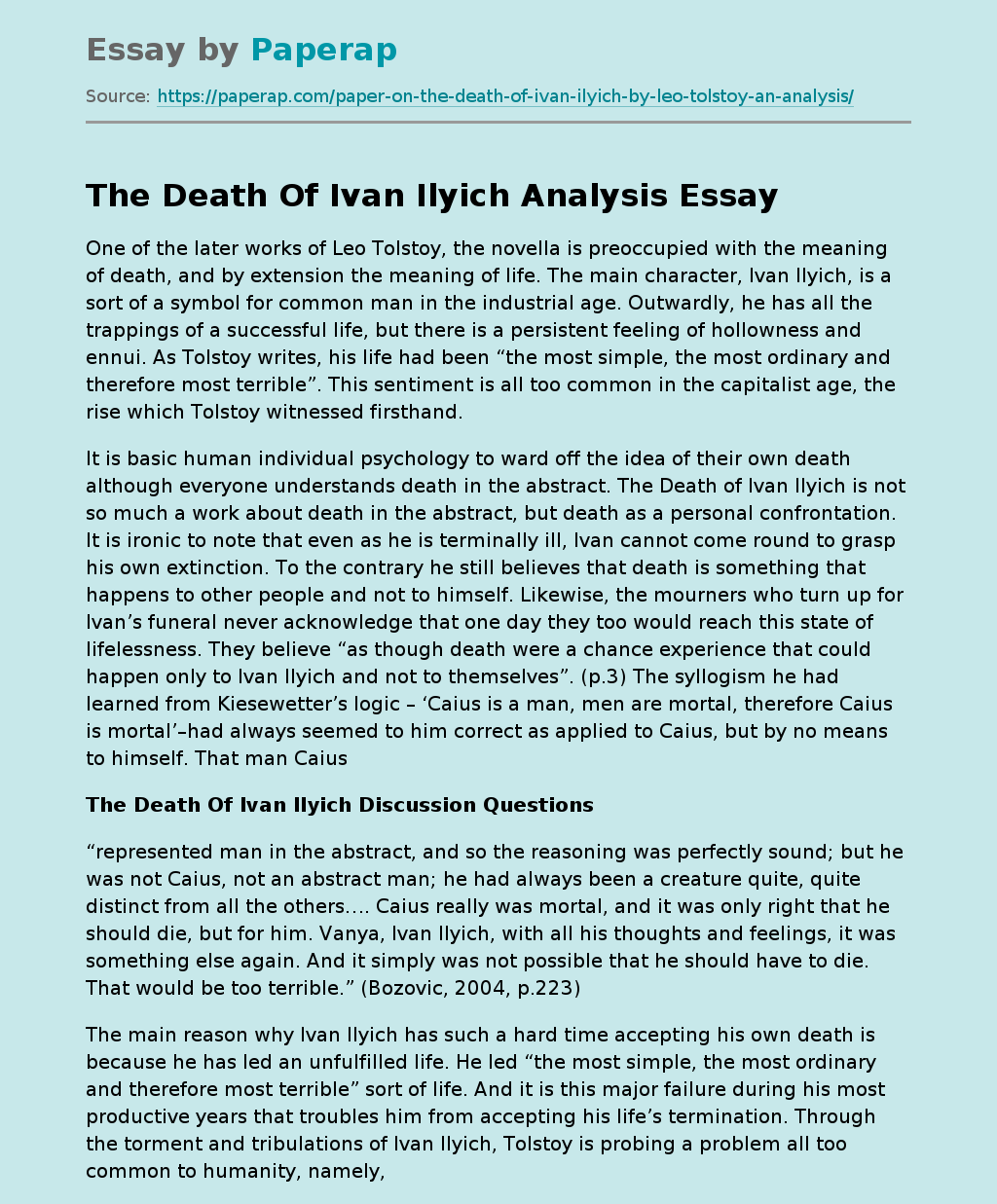The Death Of Ivan Ilyich Analysis
One of the later works of Leo Tolstoy, the novella is preoccupied with the meaning of death, and by extension the meaning of life. The main character, Ivan Ilyich, is a sort of a symbol for common man in the industrial age. Outwardly, he has all the trappings of a successful life, but there is a persistent feeling of hollowness and ennui. As Tolstoy writes, his life had been “the most simple, the most ordinary and therefore most terrible”. This sentiment is all too common in the capitalist age, the rise which Tolstoy witnessed firsthand.
It is basic human individual psychology to ward off the idea of their own death although everyone understands death in the abstract. The Death of Ivan Ilyich is not so much a work about death in the abstract, but death as a personal confrontation. It is ironic to note that even as he is terminally ill, Ivan cannot come round to grasp his own extinction. To the contrary he still believes that death is something that happens to other people and not to himself.
Likewise, the mourners who turn up for Ivan’s funeral never acknowledge that one day they too would reach this state of lifelessness. They believe “as though death were a chance experience that could happen only to Ivan Ilyich and not to themselves”. (p.3) The syllogism he had learned from Kiesewetter’s logic – ‘Caius is a man, men are mortal, therefore Caius is mortal’–had always seemed to him correct as applied to Caius, but by no means to himself.
That man Caius
The Death Of Ivan Ilyich Discussion Questions
“represented man in the abstract, and so the reasoning was perfectly sound; but he was not Caius, not an abstract man; he had always been a creature quite, quite distinct from all the others…. Caius really was mortal, and it was only right that he should die, but for him. Vanya, Ivan Ilyich, with all his thoughts and feelings, it was something else again. And it simply was not possible that he should have to die. That would be too terrible.” (Bozovic, 2004, p.223)
The main reason why Ivan Ilyich has such a hard time accepting his own death is because he has led an unfulfilled life. He led “the most simple, the most ordinary and therefore most terrible” sort of life. And it is this major failure during his most productive years that troubles him from accepting his life’s termination. Through the torment and tribulations of Ivan Ilyich, Tolstoy is probing a problem all too common to humanity, namely, how one can live a life uncompromised. Indeed, it is the least controversial lifestyles are the most compromised in terms of essence. In other words, it is extremely difficult to live for one’s own aspirations and to fulfill one’s true calling with complete honesty, liberty and integrity. The reason why Ilyich had attained high office toward the end of his career is in large part because he went along with the established social, cultural and political norms. Had he dared question the flaws in the system and had he tried to distance himself from corruption that is ubiquitous in society then he would have made a lot of enemies. As a consequence, his reputation and social goodwill will diminish. If he had chosen to be morally upright whenever confronted with the flaws inherent in society he would not have had a successful career. Hence, looking the other way is the basis for his material and social success. Tolstoy is unambiguous in his stance that such a life is not worth living. In many ways this authorial position is resonant with Plato’s famous claim that “an unexamined life is not worth living”.
The story is also a metaphorical journey toward illumination, in that, Ilyich only truly understands the failure of his erstwhile existence upon the shock of facing death. In this sense his approach toward his finality is an awakening to his own repressed reality. In his case the repression is so internalized and automatic that he carried a feeling of living a successful and responsible life. This feeling was nothing but an illusion which gave respectability to the mundane and trivial existence. By not heeding to what his true calling in life is, Ilyich had lived “the most simple, the most ordinary and therefore most terrible” life. This individual experience highlights a broader social phenomena, namely, the refusal to accept death in a gracefully and pragmatically. We have, in our culture,
“an unspoken agreement not to speak about our own death. Mention of it is withheld lest we appear tactless, self-indulgent, neurotic, morbid, or even cowardly. There is no precise language to name death, to accept death and our dead. Without such a language we cannot integrate it. Integration requires metaphor and ritual. When as a group we are confronted with an image of dread, the group mind clangs shut. It is through the symbolic, the metaphors and rituals, that a group is able to integrate its fate collectively and individually.” (Klement, 1994, p.73)
Works Cited
Bozovic, Miran. “Auto-Iconicity and Its Vicissitudes: Bentham and Plato.” Helios31 (2004): 223+. Klement, Vera. “An Artist’s Notes on Aging and Death.” Art Journal1 (1994): 73+. Tolstoy, 1981. The Death of Ivan Ilyich. Trans. Lynn Solotaroff. New York
The Death Of Ivan Ilyich Analysis. (2019, Dec 05). Retrieved from https://paperap.com/paper-on-the-death-of-ivan-ilyich-by-leo-tolstoy-an-analysis/

